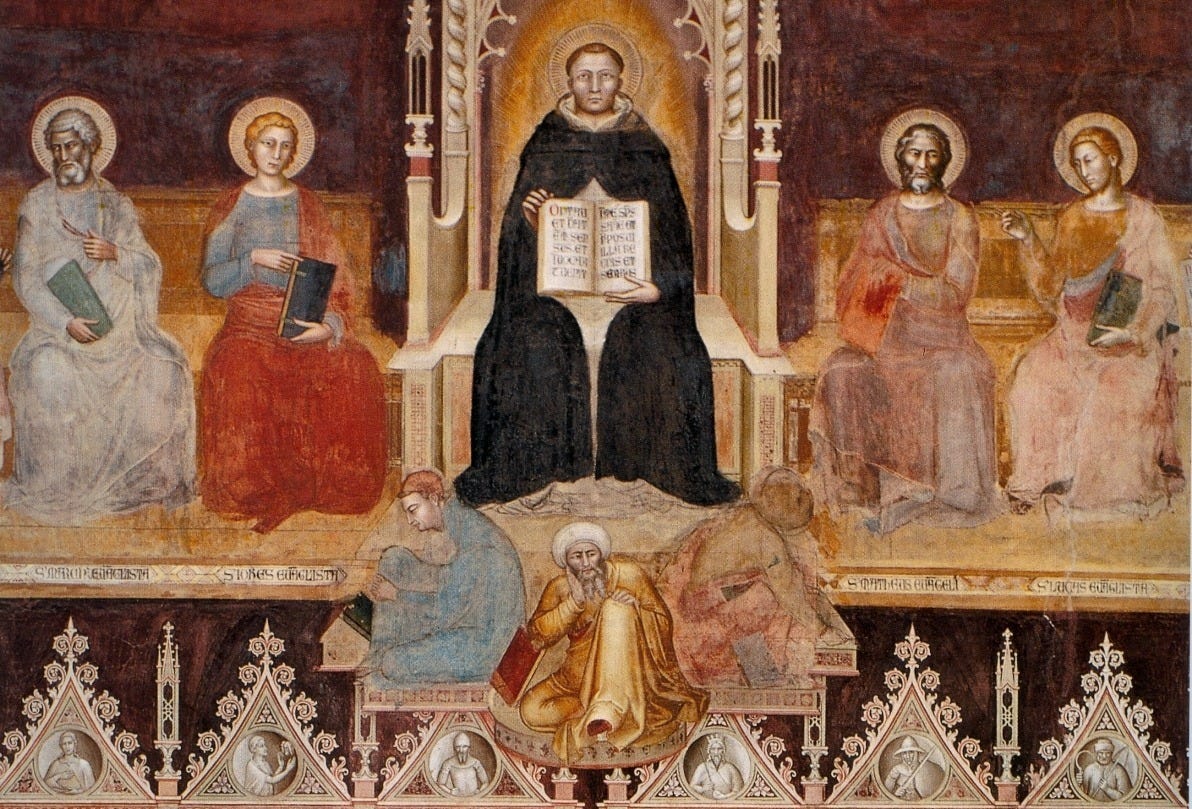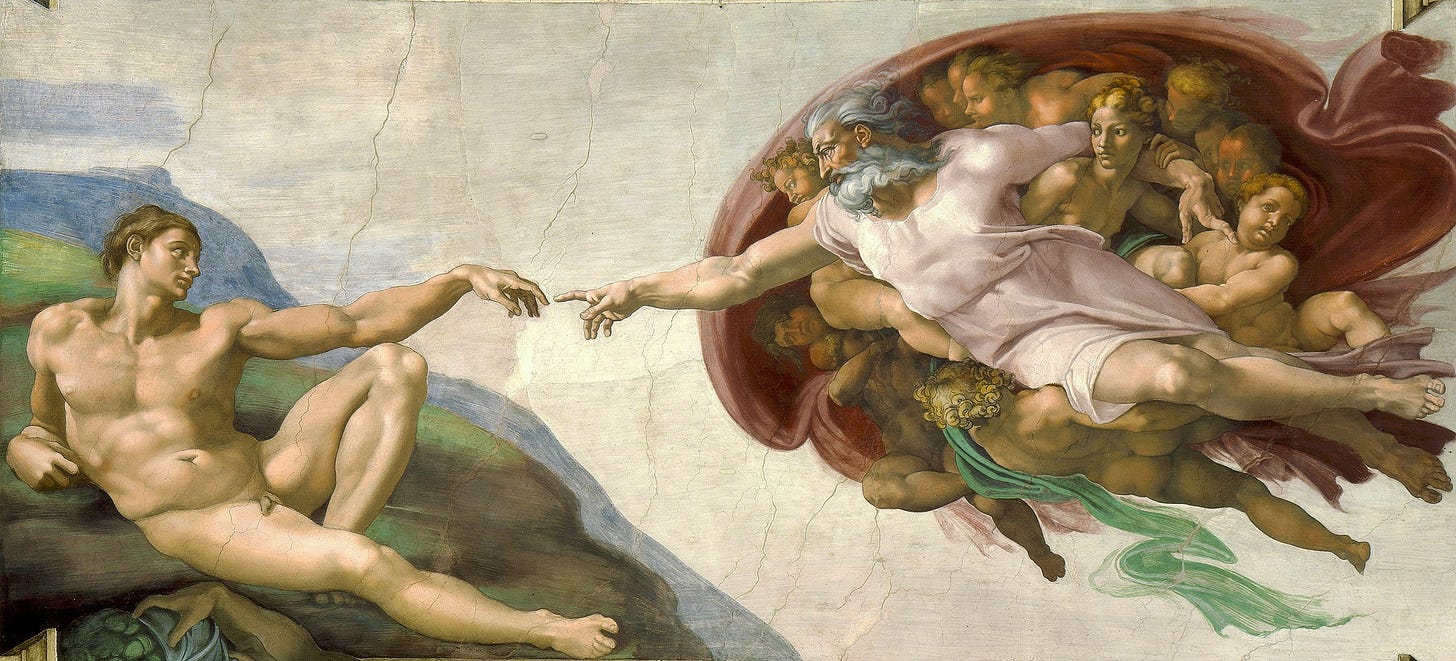C.S. Lewis' Best Lesson on Evil
Your Choice to Become More Real.
Imagine people in hell could take a bus ride to heaven. You might think it sounds cruel… but what if the people from hell could stay if they wanted to?
Yet, here is surprising part—almost all of them choose to return to hell.
In his masterpiece, The Great Divorce, C.S. Lewis uses visitors from hell rejecting heaven to peel back the layers of human choice. It is not a tale about the actual afterlife, but rather a parable about why people choose what is evil over what is good.
Yet, one of the greatest lessons in The Great Divorce is not demonstrated by a choice at all—but rather by the grass of heaven.
C.S. Lewis takes a simple scene and uses it teach you a profound theological truth—the choices you make shape the very reality (or unreality) of who you are.
Reminder: you can support our mission and get all our members-only content for just a few dollars per month:
New, full-length articles every Tuesday and Friday
The entire archive of members-only essays
Access to our paid subscriber chat room
The Bus Ride from Hell to Heaven
When the visitors from hell disembark from the bus to heaven, they notice something quite peculiar—they are transparent. C.S. Lewis describes them like a smudge on a window, a living shadow. In contrast, the heaven around them is brilliant in color and lucidity—it is solid.
Then comes one of the most memorable scenes of the story.
The shades attempt to walk amongst this celestial garden, and it hurts them. They do not even bend the grass. In fact, the grass bends them! Like a thousand diamond spikes into their feet, the shades have little weight or substance. The hellish visitors cannot pick up apples or enter the water. In fact, a falling leaf or swaying branch could crush them.
C.S. Lewis presents a stunning contrast—but what is he trying to teach you, the reader, about good and evil?
The Surprising Nature of Evil
Evil is not real. You may think good and evil are equal opposites, as many do. Christianity, however, holds that good and evil are not equals. In fact, evil is not real.
You might push back and say that evil must be real in some manner, because it is intelligible—you can know it. It has a name. You could think of it this way: evil is real like a hole in the ground is real. It is an absence.
St. Thomas Aquinas, drawing from Neoplatonic tradition, teaches that “evil is the privation of the good.” In other words, it is the absence of good. It is darkness to light or cold to heat.
C.S. Lewis shows this by having the citizens of hell be less real than even a single blade of heavenly grass. Just as all the darkness of the cosmos could not snuff out a single candle flame, so too would all of hell struggle to move a single blade of grass in heaven. Evil is a privation, an unreality.
You may be thinking that if the visitors from hell are not real, how do they exist at all? And that is a good question.
Creation is Good
A hole in the ground is only a hole because the ground exists. Without the ground, a hole would simply not exist. It cannot exist on its own. Evil exists in the same way. Nothing is pure evil, because if it was, it would not exist.
In other words, the good is real. Evil is unreal. To the degree something is evil, it is unreal—it suffers a lack, a privation.
Nothing is pure evil—not even Satan. He is a creature of God, and all that God has made is good. Creation is good. God did not and does not make evil. But through freedom, whether human or angelic, a being can embrace the unreal, evil, and become something less than what God had intended. But the true purpose of freedom is to choose what is good and participate in what is real.
C.S. Lewis shows this by stating the visitors from hell can stay in heaven if they choose—and by staying, they will slowly become more real. In other words, even as a damned soul in hell, they exist; thus, there is still some good in you that can be cultivated. You can become more real.
Many Christians would point out that in Christian doctrine a soul cannot leave hell and visit heaven—and certainly cannot stay and become good. Your eternity is decided at your death, as when you die, you undergo your particular judgement—just you and Jesus. The determination is final.
But like Dante in his Divine Comedy, C.S. Lewis is not presenting a story to articulate the details of heaven and hell. He is telling a story to show why humans choose evil over the good—and a large part of understanding that decision is knowing the difference between good and evil.
The Choice of the Soul: Reality or Unreality
C.S Lewis’ simple lesson at the beginning of The Great Divorce allows you to see your moral choices for what they are. Will you choose what is good and become more real? Or will you choose what is evil and become less real?
In Christianity, your moral choices are not simply adhering to arbitrary rules—they are shaping the very reality (or unreality) of who you are.
You want to become more real, more yourself, and more good. In this way, you become more as God knows you to be—the real you.
Choose what is real and ascend.
—
Dcn. Harrison Garlick is a deacon, husband, father, Chancellor, and attorney. He lives in rural Oklahoma with his wife and five children. He is also the host of Ascend: The Great Books Podcast. Follow him on X at Dcn. Garlick or Ascend.






The absence of good. Not the opposite of good. Such an appropriate description for evil. Like when the opposite of love is not hate, but indifference. Once again, thank you for these teachings. Next time I go to the English Library (Biblioteca del Anglo) in Montevideo, I shall ask for that book.
One of the best modern Christian authors, very glad you covered a less famous work. Now I’m curious about whether Tolkien has other books filled with rich religious theology like Lewis’ The Great Divorce.